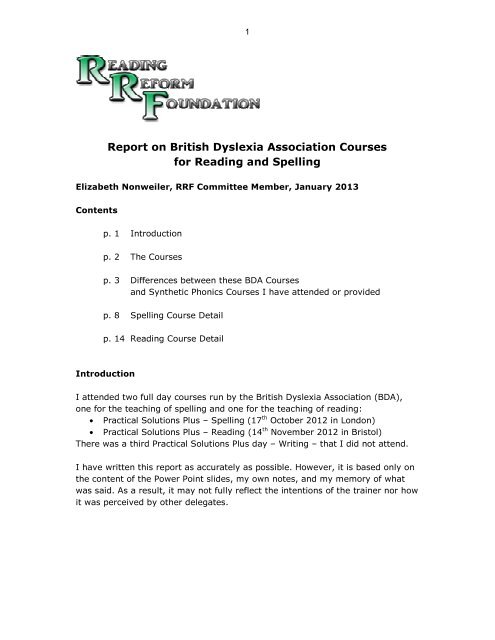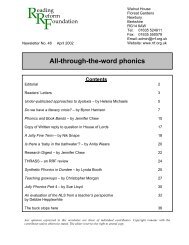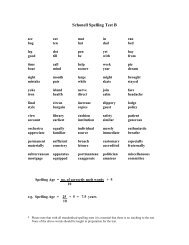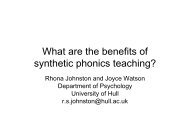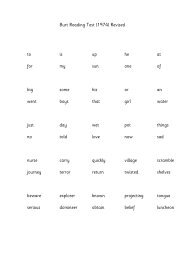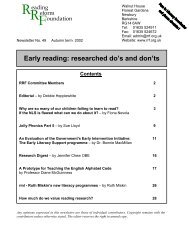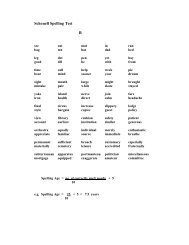A Report on British Dyslexia Association Training courses
A Report on British Dyslexia Association Training courses
A Report on British Dyslexia Association Training courses
You also want an ePaper? Increase the reach of your titles
YUMPU automatically turns print PDFs into web optimized ePapers that Google loves.
1<br />
<str<strong>on</strong>g>Report</str<strong>on</strong>g> <strong>on</strong> <strong>British</strong> <strong>Dyslexia</strong> Associati<strong>on</strong> Courses<br />
for Reading and Spelling<br />
Elizabeth N<strong>on</strong>weiler, RRF Committee Member, January 2013<br />
C<strong>on</strong>tents<br />
p. 1 Introducti<strong>on</strong><br />
p. 2 The Courses<br />
p. 3 Differences between these BDA Courses<br />
and Synthetic Ph<strong>on</strong>ics Courses I have attended or provided<br />
p. 8 Spelling Course Detail<br />
p. 14 Reading Course Detail<br />
Introducti<strong>on</strong><br />
I attended two full day <strong>courses</strong> run by the <strong>British</strong> <strong>Dyslexia</strong> Associati<strong>on</strong> (BDA),<br />
<strong>on</strong>e for the teaching of spelling and <strong>on</strong>e for the teaching of reading:<br />
• Practical Soluti<strong>on</strong>s Plus – Spelling (17 th October 2012 in L<strong>on</strong>d<strong>on</strong>)<br />
• Practical Soluti<strong>on</strong>s Plus – Reading (14 th November 2012 in Bristol)<br />
There was a third Practical Soluti<strong>on</strong>s Plus day – Writing – that I did not attend.<br />
I have written this report as accurately as possible. However, it is based <strong>on</strong>ly <strong>on</strong><br />
the c<strong>on</strong>tent of the Power Point slides, my own notes, and my memory of what<br />
was said. As a result, it may not fully reflect the intenti<strong>on</strong>s of the trainer nor how<br />
it was perceived by other delegates.
The Courses<br />
The following are descripti<strong>on</strong>s of the <strong>courses</strong> from the BDA website:<br />
Practical Soluti<strong>on</strong>s Plus<br />
Durati<strong>on</strong>: 1 - 3 Days Cost: £130 per day<br />
Practical Soluti<strong>on</strong>s Plus is designed for teachers and teaching assistants and is<br />
split into three days, each day covering a different area of literacy: reading,<br />
spelling and writing. The way the programme is structured allows for you to<br />
attend <strong>on</strong>e, two or all three days.<br />
Who it is designed for:<br />
2<br />
Teachers and teaching assistants working with children with SpLDs will find<br />
these days very beneficial. As each day is devoted to a specific area of literacy,<br />
time is available to discuss how best to work with children with varying<br />
weaknesses. For example alternative methods are looked at to help children with<br />
auditory or visual distracti<strong>on</strong>.<br />
Please note: it is essential that participants have at least a rudimentary<br />
knowledge of SpLDs. If you do not have this knowledge we recommend you<br />
attend the Practical Soluti<strong>on</strong>s for Teachers and TAs before attending these<br />
<strong>courses</strong>.<br />
Learning Objectives<br />
By the end of the Reading day participants will:<br />
• Understand the skills that are required for reading.<br />
• Understand a multi sensory approach to teaching reading.<br />
• Understand the importance of ph<strong>on</strong>ological awareness in relati<strong>on</strong> to reading.<br />
• Understand strategies to develop both basic and higher reading skills.<br />
By the end of the Spelling day participants will:<br />
• Understand the skills that are required for spelling.<br />
• Understand the difficulties experienced by dyslexic individuals.<br />
• Understand strategies to develop and improve spelling.<br />
By the end of the Writing day participants will:<br />
• Understand some of the difficulties faced by dyslexic individuals in relati<strong>on</strong> to<br />
handwriting and creating pieces of written work.<br />
• Identify some support strategies for handwriting difficulties and for organising<br />
written work.
3<br />
Differences between these BDA Courses<br />
and Synthetic Ph<strong>on</strong>ics Courses I have Attended<br />
or Provided<br />
Summary of the Differences<br />
BDA Courses<br />
• <strong>Dyslexia</strong> is described as a specific<br />
learning difficulty.<br />
• Dyslexics are seen as a distinct<br />
group requiring different<br />
teaching.<br />
• It is important to diagnose<br />
dyslexia.<br />
• A range of different strategies<br />
was recommended for reading<br />
words.<br />
• “Miscue Analysis” was advocated.<br />
• There was no clear explanati<strong>on</strong> of<br />
the English alphabetic code.<br />
• The emphasis was <strong>on</strong> planning<br />
for individualised teaching.<br />
• Reading and spelling were treated<br />
as separate topics.<br />
• Decoding and reading<br />
comprehensi<strong>on</strong> were not clearly<br />
separated.<br />
Synthetic Ph<strong>on</strong>ic Courses<br />
The term “dyslexia” is seen as<br />
unhelpful – the aim is to make sure<br />
every<strong>on</strong>e learns to read.<br />
Synthetic ph<strong>on</strong>ics teaching is<br />
recommended for all.<br />
It is important to identify all pupils<br />
who have difficulties learning to read.<br />
Only ph<strong>on</strong>ics is recommended for<br />
reading words (and morphology and<br />
etymology later).<br />
“Miscue analysis” is not advocated.<br />
Time is spent explaining the<br />
complexities of the English alphabetic<br />
code.<br />
The emphasis is <strong>on</strong> following a<br />
systematic programme.<br />
Word reading and spelling are<br />
described as reversible processes,<br />
taught together.<br />
Reading is described as the product<br />
of decoding and language<br />
comprehensi<strong>on</strong>.
4<br />
Further Details of the Differences<br />
BDA Course Synthetic Ph<strong>on</strong>ic Courses<br />
• It was emphasised that<br />
dyslexia is a specific<br />
learning difficulty and that<br />
it is important to diagnose<br />
it.<br />
• “Dyslexics” were seen as a<br />
distinct group requiring<br />
different teaching from<br />
others. Analysing the<br />
special attributes of<br />
dyslexia was seen as<br />
essential to finding the best<br />
ways to help them. The<br />
difficulties dyslexics have in<br />
learning to read were<br />
emphasised.<br />
• Those with reading and<br />
spelling difficulties are<br />
assessed using special tests<br />
designed to show whether<br />
or not they are dyslexic.<br />
While it is recognised that some pupils<br />
have much more difficulty than others<br />
in learning to read, the term<br />
“dyslexia” is avoided. It is seen as<br />
unhelpful, because the aim is to make<br />
sure all pupils (except a very few with<br />
profound learning difficulties) learn to<br />
read, regardless of whether or not<br />
they have been diagnosed as dyslexic.<br />
The emphasis is <strong>on</strong> synthetic ph<strong>on</strong>ics<br />
as the most effective method for<br />
teaching every<strong>on</strong>e to read and spell,<br />
and crucial for those who find it<br />
difficult. An emphasis <strong>on</strong> the attributes<br />
of dyslexics is seen as detrimental,<br />
because it may result in low<br />
expectati<strong>on</strong>s, instead of a<br />
determinati<strong>on</strong> to teach every pupil to<br />
read.<br />
Special assessments to diagnose<br />
dyslexia are not recommended.<br />
However, teachers are told about the<br />
importance of assessment to find<br />
where gaps are in pupils’ knowledge of<br />
the alphabetic code and whether they<br />
are able to blend sounds for reading<br />
and segment spoken words for<br />
spelling, so that teaching can be<br />
targeted to pupils’ needs.
• It was emphasised that<br />
every dyslexic is different.<br />
As a result, a range of<br />
different strategies for<br />
different pupils were<br />
recommended and<br />
described. Ph<strong>on</strong>ics was<br />
included as an important<br />
strategy. Whole word<br />
learning and analogy were<br />
particularly recommended<br />
too.<br />
• The use of “Miscue<br />
Analysis” was praised. With<br />
“Miscue Analysis”, teachers<br />
listen to pupils reading and<br />
analyse their mistakes in<br />
order to identify the<br />
strategies they use<br />
(syntactic, graphic,<br />
ph<strong>on</strong>emic, semantic).<br />
5<br />
It is maintained that every pupil,<br />
regardless of their individual<br />
attributes, will benefit from knowledge<br />
and understanding of the alphabetic<br />
code and learning the skills of<br />
blending sounds for reading and<br />
segmenting spoken words to identify<br />
sounds for spelling. This learning is<br />
not just beneficial, but essential for<br />
those who do not learn to read and<br />
spell easily. The use of other<br />
strategies for learning to read words is<br />
seen as c<strong>on</strong>fusing and potentially<br />
damaging, especially for those who<br />
have difficulty learning to read.<br />
Miscue analysis is not menti<strong>on</strong>ed,<br />
unless it is raised by delegates. It is<br />
seen as unhelpful to analyse the cues<br />
pupils use to read. Decoding<br />
accurately (“ph<strong>on</strong>emic strategy”) is<br />
seen as the <strong>on</strong>ly sensible way to read<br />
initially (knowledge of morphemes is<br />
important later). Other ways, such as<br />
trying to remember whole words<br />
(graphic) or guessing from c<strong>on</strong>text<br />
(syntactic and semantic) are seen as<br />
ineffective at best and harmful for<br />
those who do not learn to read easily.<br />
This is because these strategies work<br />
<strong>on</strong>ly with texts for young children or<br />
texts designed for teaching reading in<br />
that way; they do not help pupils to<br />
read unfamiliar words and they may<br />
encourage habits that are difficult to<br />
break.
• Aspects of the alphabetic<br />
code and terms such as<br />
“ph<strong>on</strong>eme”, “grapheme”,<br />
“sounding out”, “patterns”<br />
(mainly graphemes with<br />
more than <strong>on</strong>e letter, e.g.<br />
digraphs), different<br />
spellings for the same<br />
sounds, etc., were included<br />
in the training, but there<br />
was no specific time given<br />
to a clear explanati<strong>on</strong> of the<br />
English alphabetic code.<br />
Examples of c<strong>on</strong>fusing<br />
aspects of the code were<br />
given. The emphasis was <strong>on</strong><br />
the fact that English is very<br />
difficult to learn and the<br />
impressi<strong>on</strong> given was that<br />
there is no logic to it.<br />
• Although some programmes<br />
were menti<strong>on</strong>ed, the<br />
emphasis was <strong>on</strong> identifying<br />
the specific difficulties of<br />
individual pupils and<br />
providing a range of<br />
activities to address these<br />
difficulties. Programmes<br />
and resources were<br />
suggested as useful for<br />
providing this individualised<br />
help, but not as central.<br />
6<br />
Time is spent explaining the<br />
complexities of the English alphabetic<br />
code, i.e., that<br />
- there are about 44 ph<strong>on</strong>emes in<br />
English and how to pr<strong>on</strong>ounce<br />
them<br />
- that they are represented by <strong>on</strong>e<br />
or more letters (because in English<br />
we have about 44 ph<strong>on</strong>emes, but<br />
<strong>on</strong>ly 26 letters)<br />
- that some ph<strong>on</strong>emes may be<br />
represented in different ways<br />
(boat, home, snow, go)<br />
- that some graphemes represent<br />
different ph<strong>on</strong>emes (chip, school,<br />
machine)<br />
Most synthetic ph<strong>on</strong>ics <strong>courses</strong><br />
provide some sort of chart, to show<br />
this more clearly. The aim is for<br />
teachers to understand the logic of the<br />
code.<br />
The importance of rigorous teaching,<br />
following a systematic programme is<br />
emphasised. Where an effective<br />
programme is used for mainstream<br />
teaching, the same programme can be<br />
used with pupils who have difficulty<br />
learning to read. These pupils should<br />
be assessed to find out where gaps<br />
are in their knowledge of the<br />
alphabetic code and which skills they<br />
need to practise most; then extra<br />
teaching should be provided to<br />
c<strong>on</strong>solidate learning and practise<br />
these skills. Most extraneous activities<br />
are discouraged. Only those that<br />
provide opportunities to practise or<br />
apply what has been taught as part of<br />
the programme are recommended.
• Reading and spelling were<br />
treated as separate topics,<br />
with training <strong>on</strong> separate<br />
days.<br />
• The skills of decoding and<br />
reading comprehensi<strong>on</strong><br />
were not clearly separated.<br />
Similarly, the skills of<br />
compositi<strong>on</strong>, spelling and<br />
hand-writing were not<br />
clearly separated.<br />
7<br />
There is an emphasis <strong>on</strong> the fact that<br />
reading and spelling are reversible<br />
processes that should be taught<br />
together, with <strong>on</strong>e supporting the<br />
other.<br />
It is made clear that reading<br />
comprehensi<strong>on</strong> is the result of two<br />
separate processes - decoding and<br />
understanding language (as in “The<br />
Simple View of Reading”, first defined<br />
by Gough and Tunmer, 1986) and<br />
both are essential. Similarly,<br />
independent writing depends <strong>on</strong> the<br />
ability to express <strong>on</strong>eself<br />
(compositi<strong>on</strong>) and the skills of spelling<br />
and handwriting. While emphasising<br />
the importance of understanding and<br />
using spoken language, synthetic<br />
ph<strong>on</strong>ics <strong>courses</strong> c<strong>on</strong>centrate <strong>on</strong> the<br />
knowledge and skills needed for<br />
decoding and spelling, and most<br />
<strong>courses</strong> include some discussi<strong>on</strong> of<br />
handwriting.<br />
It is emphasised that teachers should<br />
find out whether reading difficulties<br />
are due to difficulties with decoding or<br />
difficulties with comprehensi<strong>on</strong> and<br />
teach accordingly.
Spelling Course Detail:<br />
Words in italics and colour are my comments.<br />
First, there was a summary of the questi<strong>on</strong>s to be answered in the course:<br />
1. Why is English so difficult?<br />
2. What skills do we use for spelling in English?<br />
3. What are the implicati<strong>on</strong>s of these for our pupils?<br />
4. What can we do to help?<br />
8<br />
1. Why is English so difficult?<br />
o history and influences of different languages<br />
o opaque compared with transparent code<br />
o large number of letters in some syllables (e.g. “strengths” – <strong>on</strong>e syllable,<br />
9 letters, from Usha Goswami). A l<strong>on</strong>g string of letters is difficult for those<br />
who have problems with processing sounds or have visual problems<br />
o “If we say they can get by with pure ph<strong>on</strong>ics, we are telling them a lie”,<br />
because of words such as “tomb”, “comb” and “bomb”.<br />
We would say that the letter “o” represents different ph<strong>on</strong>emes in each<br />
word, and that is ph<strong>on</strong>ics.<br />
o But most words are taught according to a regular pattern (84% according<br />
to a computer analysis of 17,000 words)<br />
2. What skills do we use for spelling in English?<br />
o We were asked to look at a few words and identify the skills we used to<br />
read them, e.g. “socks” – root word “sock”; “misshapen” – root word +<br />
prefix and suffix; analogy, which ph<strong>on</strong>eme for “ou” in “grout” – think of<br />
rhyming words “out”, “about”, “shout”<br />
o L<strong>on</strong>g list of skills:<br />
- Listening and studying articulati<strong>on</strong><br />
- Sound discriminati<strong>on</strong> (th? f?)<br />
- Clear “mind’s ear” representati<strong>on</strong> – auditory sequential memory<br />
[ASM]<br />
- Ph<strong>on</strong>eme/grapheme corresp<strong>on</strong>dence<br />
- Blending – sound patterns<br />
- Recogniti<strong>on</strong> of syllables and morphemes<br />
- Knowledge of spelling rules<br />
- Knowledge of vocabulary<br />
- Familiarity with mechanics of writing + pencil c<strong>on</strong>trol + letter<br />
formati<strong>on</strong><br />
I add the skill of listening for the sounds in words, i.e., segmenting the<br />
spoken word to identify the sounds in a word. I would not say that<br />
blending is needed for spelling, except to check a word after spelling it.<br />
Otherwise, I agree with this list.
9<br />
However, for training I would not give a list like this, as it makes the<br />
process sound very complicated. The mechanics of handwriting involve<br />
separate skills from spelling and can be included in training as a separate<br />
topic. My list for skills and knowledge for spelling would be:<br />
- Identifying the sounds in words<br />
- Knowledge of ph<strong>on</strong>eme-grapheme corresp<strong>on</strong>dences<br />
- Knowledge of root words, prefixes and suffixes<br />
All the other skills menti<strong>on</strong>ed are parts of these.<br />
3. What are the implicati<strong>on</strong>s of these for our pupils?<br />
o We were given this list of what pupils need to know:<br />
- Articulati<strong>on</strong><br />
- Ph<strong>on</strong>eme → grapheme corresp<strong>on</strong>dences<br />
- Letter names<br />
- Comm<strong>on</strong> irregular words (“sight” words)<br />
- Spelling patterns and rules<br />
- Syllable structure<br />
- Morphemes /affixes<br />
- Word origins and derivati<strong>on</strong>s<br />
I agree with this list, except that teaching the essential skill of identifying<br />
sounds (by segmenting spoken words) is missing. It was pointed out that<br />
“ph<strong>on</strong>eme → grapheme corresp<strong>on</strong>dences” are not enough for spelling. I<br />
agree, but identifying sounds al<strong>on</strong>gside learning ph<strong>on</strong>eme → grapheme<br />
corresp<strong>on</strong>dences is the first step needed to learn to spell. This was not<br />
made clear.<br />
4. What can we do to help?<br />
o We went through how to help pupils with:<br />
- Articulatory awareness – distinguishing between /th/.../f/, /p/...<br />
/b/, /s/... /sh/, /tr/.../ch/<br />
We were shown “Springboard for Children” – a video for articulating<br />
sounds (seeing mouth) Difficulties with articulati<strong>on</strong> before age 5<br />
½ - no problem, but after 5 ½ likely to result in literacy<br />
difficulties.<br />
- Auditory discriminati<strong>on</strong><br />
Suggested activities: Make up alliterative sentences. Identify sounds<br />
at beginning, middle and end of words.<br />
I have found teachers spending too l<strong>on</strong>g asking children whether<br />
sounds are at the “beginning”, “middle” or “end” of words and no<br />
l<strong>on</strong>ger advise this.<br />
Discriminate between words like “pail” and “bail”. Segment and blend<br />
– “start with larger chunks ... ba...na...na...”.<br />
I advise starting with ph<strong>on</strong>emes.
10<br />
- Learning letter shapes: Trace letter, say its sound and name,<br />
practise writing, saying sound and name (avoid schwa), write<br />
from memory saying sound and name, write with eyes shut, put<br />
hand in a bag to find plastic letter.<br />
- Developing awareness of syllables<br />
Clap and tap, “but some dyslexics may not like this,” because<br />
dyspraxic. Sing to hear beat of each syllable.<br />
“There are rules but they’re not always true.” e.g. vowel in every<br />
syllable, but “prism”<br />
Teachers can get “too hung up about closed and open syllables”<br />
o Rules and Patterns<br />
They are important for the dyslexic learner because they help to<br />
explain why words are spelt the way they are and add an amount of<br />
c<strong>on</strong>sistency.<br />
Most people just pick up <strong>on</strong> such rules and patterns – dyslexic<br />
learners often d<strong>on</strong>’t unless they are pointed out. They may not be<br />
visual learners who learn to spell from their reading or they may not<br />
have had enough exposure to written texts to learn spelling from<br />
them.<br />
Rules give additi<strong>on</strong>al word attack skills for spelling.<br />
It was emphasised that rules should not be taught in isolati<strong>on</strong>.<br />
“Always link rules to activities or words they are doing anyway.”<br />
We were given 18 rules for spelling and went through them at<br />
length. (I did not take clear notes about what the 18 rules are.)<br />
o Spelling by analogy, including spelling patterns, word families, <strong>on</strong>setrime<br />
(e.g. sight, light, tight,...)<br />
o Rhymes – use poems, limericks, s<strong>on</strong>gs, rap<br />
o Spelling techniques: Look, Cover, Write, Check or with an adult –<br />
Echo, Spell, Write, Check (Teacher says; pupil echoes)<br />
o Motor memory: encourage cursive writing, use “Rainbow writing”<br />
(Write words using cursive writing in different colours.) Also, touch<br />
typing memory (use “Nessie” or “Dance Mat” for touch typing.<br />
o Mnem<strong>on</strong>ics, e.g., “Big Elephants Can’t Always Use Small Exits” and<br />
“Rhythm Has Your Two Hips Moving”<br />
o Then the importance of multi-sensory learning – Visual, Auditory and<br />
Kinaesthetic (VAK)<br />
o Multi-sensory activities for teaching spelling:<br />
- Listen to words, say words, look at words, write words, spell aloud<br />
using letter names (fine to use sounds for CVC words, but should use<br />
letter names later)<br />
- Sand/shaving foam tray, plastic letters, back writing, pictorial aids for<br />
particular letter patterns (e.g. thief, chief), physical spelling<br />
- Neuro Linguistic Programming (NLP) visualisati<strong>on</strong>
11<br />
- Homoph<strong>on</strong>es<br />
- Words within words<br />
- Word Chains (e.g. bet→bent→bend→blend→bland→blank)<br />
- Cutting up words<br />
- play word dominoes with root words and affixes (plastic “Word Building<br />
Dominoes” from Educati<strong>on</strong>al Insights)<br />
- Pair games<br />
- Hunt the silent letter/the spelling pattern / the 2/3/4/5/ syllable word<br />
(can help scanning skills for later)<br />
- Syllable flaps (paper folded to show, e.g., ba na na)<br />
- Bingo<br />
- L<strong>on</strong>gest word competiti<strong>on</strong><br />
- Shann<strong>on</strong>’s game (like Hangman, but you have to guess in the correct<br />
order)<br />
- Dicey Spelling (writing words with eyes shut, opposite hand, bubble<br />
writing, ...)<br />
- Visualisati<strong>on</strong> – Close eyes and picture the word.<br />
-<br />
o Spelling Aids – Dicti<strong>on</strong>aries, letter strips, pers<strong>on</strong>alised dicti<strong>on</strong>aries, subject<br />
specific glossaries, Nessie – Click <strong>on</strong> Nessie’s eyes to see correct spelling,<br />
feed specialised vocabulary into computer dicti<strong>on</strong>ary. Let children have<br />
words they misspell or topic swords <strong>on</strong> a card with them.<br />
o Higher level spelling skills<br />
- affixes, morphemes, word origins, subject specialist vocabulary and<br />
activities to teach these. We were asked to make a list of<br />
prefixes and suffixes and identify the meaning and grammatical<br />
functi<strong>on</strong> of each.<br />
- l<strong>on</strong>ger pieces of writing: load specialist vocabulary into computer<br />
dicti<strong>on</strong>ary; first draft have a go or write the first sound or leave<br />
a blank or write in brackets; mark for 5 spellings <strong>on</strong>ly, focus <strong>on</strong><br />
c<strong>on</strong>tent vocabulary,<br />
- activities for teaching these<br />
- praised “Alpha to Omega”<br />
- Proof-reading: need for awareness and self-correcti<strong>on</strong>, read aloud,<br />
check past tense endings, vowel in every syllable, rules for<br />
prefixes and suffixes, hom<strong>on</strong>yms (?). Could use script to speech<br />
software<br />
o Assistive Technologies:<br />
- Wordshark, ClaroRead, TextHelp: Read and Write Gold (speech to<br />
text and text to speech), WordQ and SpeakQ (Higher Ed level,<br />
build in bank of specialist vocab, then uses predictive text),<br />
Penfriend XL, Co:Wiriter6, Clicker 6, WriteOnline, Pocket spell
12<br />
checker (Collins or Franklin), Neo 2, ICON map (? free, screen<br />
grab and cut and paste)<br />
- Games: Nessy, Progress with Quest (spelling software for children)<br />
o More useful websites<br />
- www.primaryresources, www.teachingideas.co.uk,<br />
www.spellingsociety.org, www.tes.co.uk,<br />
- bdatech.org (for people who like to try new technologies)<br />
o Other techniques discussed:<br />
- e.g. for spelling “envir<strong>on</strong>ment”, think of “R<strong>on</strong> in his envir<strong>on</strong>ment”<br />
- notice “sym” at the beginning of words, e.g. “symph<strong>on</strong>y”,<br />
“sympathy”<br />
- “ology” means a subject, so “biology”, “psychology”, “ethnology”<br />
o Recommended: “Teaching Literacy to Learners with <strong>Dyslexia</strong>: A<br />
Multisensory Approach” by Sylvia Phillips and Kath Kelly<br />
Spelling Summary<br />
This spelling summary had a slightly different list of skills from the earlier <strong>on</strong>e:<br />
o Ph<strong>on</strong>ological awareness<br />
o Ability to segment and blend<br />
o Ph<strong>on</strong>eme-grapheme knowledge<br />
o Awareness of syllables<br />
o Knowledge of rules<br />
o Knowledge of sight words<br />
o Motor memory<br />
o Knowledge of word-building<br />
Stages of Spelling Development<br />
There was a hand-out showing stages of spelling development as<br />
1. Pre-Communicative<br />
2. Partial Alphabetic<br />
3. Ph<strong>on</strong>etic<br />
4. Transiti<strong>on</strong>al<br />
5. The Correct Stage<br />
and we were asked to analyse copies of children’s writing and assign them to<br />
<strong>on</strong>e of the stages.<br />
I cannot see the point of this or how it makes a difference to teaching pupils to<br />
spell, providing pupils are taught using a systematic programme.<br />
Sorting Words
13<br />
We were given a pile of words to sort in pairs, but not told how to sort them. It<br />
became clear that they included groups of words with the same ph<strong>on</strong>eme but<br />
different graphemes (came, train, acorn, today), groups with the same<br />
grapheme-ph<strong>on</strong>eme corresp<strong>on</strong>dence (German, gentle, gypsy, gin) and groups<br />
with a simple CVC pattern (sob, wet, bit, can, keg him, ...), as well as others.<br />
Although this would be a simple exercise for any<strong>on</strong>e with synthetic ph<strong>on</strong>ics<br />
training, some of the delegates found it very difficult. They would have benefited<br />
from an overview of the alphabetic code and how <strong>on</strong>e sound can represent more<br />
than <strong>on</strong>e spelling and <strong>on</strong>e spelling can represent more then <strong>on</strong>e sound. I think<br />
the idea was that it is more effective for delegates to discover how the English<br />
alphabetic code works than to be told how. I understand the value of this, but<br />
felt delegates would have benefited from a clearer explanati<strong>on</strong> and an overview<br />
of the code, at least at some point.<br />
Other discussi<strong>on</strong>:<br />
Brain: There were discussi<strong>on</strong> and images about the differences between the<br />
brains of dyslexic and n<strong>on</strong>-dyslexics. The trainer was asked if it can be changed.<br />
She answered that there is not enough evidence but that she suspected it could<br />
not be “completely ameliorated”.<br />
Goswami: about an experiment with dyslexics and n<strong>on</strong>-dyslexics and their<br />
resp<strong>on</strong>ses to rhythm. Those who are not dyslexic can keep a rhythm but those<br />
who are dyslexic cannot as easily. “The dyslexic brain is different.” Katie Overy<br />
had success by using programmes that focus <strong>on</strong> rhythm ... very simple activities<br />
with those who have literacy difficulties. Found that the rhythm percepti<strong>on</strong> of<br />
dyslexic children in Key Stage 2 is skewed. After the activities, their literacy<br />
skills improved (spelling and reading) more than for children who didn’t take<br />
part in the activities.<br />
<strong>Dyslexia</strong>: Most children who are dyslexic have other difficulties “co-occurring<br />
disorder” ... “things going <strong>on</strong> holistically that we ignore at our peril”, e.g.<br />
dyspraxia, being “challenged with percepti<strong>on</strong> of time”<br />
C<strong>on</strong>clusi<strong>on</strong><br />
o Spelling is likely to be a persistent difficulty.<br />
o Use assistive technology where appropriate.<br />
o D<strong>on</strong>’t lose expressi<strong>on</strong> and creativity because of poor spelling.<br />
o Implement a structured, multisensory approach that builds <strong>on</strong> existing<br />
knowledge.<br />
o Make it fun!
Reading Course Detail:<br />
Words in italics are my comments.<br />
Objectives of Course:<br />
• understand skills in reading<br />
• c<strong>on</strong>sider the role of ph<strong>on</strong>ological awareness<br />
• explore strategies to develop basic reading skills and higher reading skills.<br />
Began with introducti<strong>on</strong>s and comments.<br />
“You will have kids in your class who are dyslexic but d<strong>on</strong>’t know they’re<br />
dyslexic.”<br />
Ph<strong>on</strong>ics is a “central form of teaching children to read ... but is it the best way<br />
for all children?”<br />
For dyslexics “there are deficits in getting clear representati<strong>on</strong>s of sounds,<br />
shown by brain imagery”.<br />
14<br />
Ph<strong>on</strong>ological Awareness:<br />
• Ph<strong>on</strong>ological Awareness is “the key to acquisiti<strong>on</strong> of reading ... key to<br />
dyslexia ... in other languages too”<br />
• Bilingual learners may produce behaviours similar to dyslexia, when they are<br />
not dyslexic. “If they really are dyslexic, they will not be able to overcome ...<br />
poor ph<strong>on</strong>eme awareness as easily ... Those with dyslexia will never<br />
overcome their problems ... Those with English as a sec<strong>on</strong>d language will<br />
overcome their problems (up to about the age of twelve)”<br />
• Having problems with ph<strong>on</strong>emic awareness is the “most powerful indicator of<br />
reading problems”.<br />
• If young children have ph<strong>on</strong>emic awareness problems, they may be dyslexic.<br />
• “<strong>Dyslexia</strong> is very often associated with a whole catalogue of difficulties” ...<br />
Margaret Snowling was menti<strong>on</strong>ed here ... “Children with the same genetic<br />
dispositi<strong>on</strong>” will have different outcomes. If a child is “growing up with lots of<br />
language in the home, that child may not show any signs of dyslexia ... but a<br />
child with the same dispositi<strong>on</strong> in a family with poor language at home may<br />
have extreme dyslexic difficulties.”<br />
• “It is really quite remote for a child to be <strong>on</strong>ly dyslexic ... 75% have cooccurring<br />
difficulties.”<br />
Reading Exercise:<br />
We were asked to read:<br />
“It was Gorund, and Frink, the chumpy strupner, was gringling jerundly in the<br />
splint. He was effringly tr<strong>on</strong>k because that day Armbly was dirntling the vank.”<br />
Then we completed a comprehensi<strong>on</strong> exercise and were asked how we found<br />
answers, using syntax, knowledge of high frequency words, etc. We were told<br />
that it is possible to answer questi<strong>on</strong>s, but not understand.
15<br />
Skills involved in fluent, accurate reading<br />
First there was a discussi<strong>on</strong> about skills needed:<br />
• where to start:<br />
o geography of text<br />
o shape of letters<br />
o directi<strong>on</strong>s<br />
o letters to sounds<br />
• whole word recogniti<strong>on</strong><br />
• ph<strong>on</strong>ic decoding<br />
• syllabificati<strong>on</strong><br />
• spelling rules (Reading and spelling seemed to be c<strong>on</strong>fused here.)<br />
• recognising patterns<br />
• capitalisati<strong>on</strong><br />
• punctuati<strong>on</strong><br />
“Tapping into different strategies ... we can’t say this is the strategy you should<br />
use”<br />
Then these were discussed:<br />
• orthography (linking letters to sounds, etc.) and ph<strong>on</strong>ology<br />
• meaning and c<strong>on</strong>text<br />
• use of clues pictures/textual was included as part of meaning and c<strong>on</strong>text<br />
(not as a way to guess the words)<br />
• Frith’s 3 stages of reading: Logographic, Alphabetic, Orthographic<br />
o “Children usually start at logographic stage, for example,<br />
‘MacD<strong>on</strong>ald’s’.”<br />
But not necessarily if taught with synthetic ph<strong>on</strong>ics.<br />
o Explained “26 letters represent a number of sounds” but did not say<br />
40 +.<br />
Alphabetic code not clear, but phrase “alphabetic code” was used<br />
<strong>on</strong>ce.<br />
o “orthographic” used to include “whole word recogniti<strong>on</strong>”, but said<br />
this is open to debate.<br />
• Issues that can affect dyslexic readers:<br />
o “At the heart of dyslexia”: ph<strong>on</strong>ological processing deficit.<br />
o Short term/working memory deficit, affecting decoding and<br />
comprehensi<strong>on</strong><br />
o Visual deficit (www.irlen.com – about background colours, etc.<br />
• Visual Issues: Irlen Syndrome, Hemispatial neglect<br />
www.youtube.co/watch?v=T-3LWFS5YS8&feature=related ) about severe<br />
damage to <strong>on</strong>e side of the brain and how that affects the other side
16<br />
• Importance of Ph<strong>on</strong>ological Awareness – lack of ph<strong>on</strong>emic awareness is<br />
the most powerful determinant of likelihood of failure to learn to read.<br />
But there is evidence that early diagnosis is not followed by reading failure, if<br />
children are taught to read with synthetic ph<strong>on</strong>ics.<br />
How to develop ph<strong>on</strong>ological skills: rhymes, rhythm, counting syllables,<br />
ph<strong>on</strong>eme deleti<strong>on</strong> games, segmenting/blending, finding ph<strong>on</strong>emes in words,<br />
spo<strong>on</strong>erisms, alliterative sentences.<br />
I understand that the most effective way to develop ph<strong>on</strong>ological skills is to<br />
teach children about sound-letter corresp<strong>on</strong>dences.<br />
“It has been recognised that dyslexics are poor at rhythm”.<br />
Katie Overy study – rather than tackling literacy problems through reading<br />
and writing ... lots of work <strong>on</strong> rhythm. “Doing a little rhythm games can be<br />
really beneficial.”<br />
Time spent teaching children about rhythm could be used to teach them to<br />
read directly.<br />
• Learning letters: Use pictures to match sounds to symbols, pure sounds,<br />
upper and lower case together (Brain research suggests better together),<br />
multisensory practice, overlearning, (recommended “Dyslexikit”) , Reading<br />
Cards. Emphasised multisensory.<br />
• Skills for word reading:<br />
o grapheme-ph<strong>on</strong>eme corresp<strong>on</strong>dence, ability to blend sounds, decoding<br />
by analogy (spelling patterns, <strong>on</strong>set and rime), knowledge of sight<br />
words (described as for “completely irregular words”), knowledge of<br />
syllable structure, knowledge of morphemes and word grammar<br />
“Children who are learning to read in English need to develop multiple<br />
strategies in parallel if they are to become successful readers ... wholeword<br />
recogniti<strong>on</strong>, e.g., choir, yacht; rhyme analogy, e.g., light, night,<br />
fight (described as “irregular”); and grapheme-ph<strong>on</strong>eme decoding<br />
strategies so that they can read “regular words” like tip, fat, dog.<br />
“Ph<strong>on</strong>ics al<strong>on</strong>e is just not right.” About government promoti<strong>on</strong> of synthetic<br />
ph<strong>on</strong>ics: “It’s very dangerous.” “You need all of these strategies.” (whole<br />
word, other strategies)<br />
• Explained dyslexia other countries – still dyslexic but slower.<br />
“English dyslexics may never learn to spell accurately and always find reading<br />
tough.”<br />
• We were asked to sort a list of high frequency words into 3 columns:<br />
c<strong>on</strong>s<strong>on</strong>ants and short vowels, patterns, irregular<br />
• Use wooden or plastic letters or letter/syllable cards to blend sounds in<br />
words, e.g. ca+t or c+at or practise <strong>on</strong>set-rime e.g. t+ap.
17<br />
• root words, suffixes and prefixes Other dominoes for root words, suffixes<br />
and prefixes. We played with these.<br />
I thought they would be good for helping pupils to understand morphemes.<br />
We made words using suffixes and prefixes, e.g. unhelpfulness.<br />
• Stressed the importance of understanding syllables. We were asked to check<br />
words to see that there is a vowel for every syllable and it was pointed out<br />
that it doesn’t always work.<br />
• Miscue Analysis It was stressed that miscue analysis is very valuable. We<br />
went through each type of error (grammatically sensible substituti<strong>on</strong>s,<br />
bizarre substituti<strong>on</strong>s – “barking at print”/reading without comprehensi<strong>on</strong>,<br />
tracking problems, over-reliance <strong>on</strong> whole-word or ph<strong>on</strong>ic decoding<br />
strategies, omissi<strong>on</strong> of small words. We were given examples of errors and<br />
told how they showed <strong>on</strong>e strategy or another.<br />
But all the examples given were decoding errors.<br />
“If you are <strong>on</strong>ly looking at accuracy, you are missing a lot.”<br />
“Never use a test that does not include comprehensi<strong>on</strong>.”<br />
“A bright dyslexic might understand, but replace words with other words<br />
which make sense.”<br />
• Higher reading skills Bringing together accuracy + fluency + understanding<br />
• What Good Readers Do A l<strong>on</strong>g list followed about predicting, asking<br />
questi<strong>on</strong>s, relating to experiences, etc.<br />
It seems to me that all of these depend <strong>on</strong> accurate word reading skills and<br />
are a distracti<strong>on</strong> if word reading skills are not secure.<br />
“Dyslexic learners will take much l<strong>on</strong>ger ... Effort involved in decoding will<br />
mean less attenti<strong>on</strong> for comprehensi<strong>on</strong>”<br />
• What makes a text difficult?... too many hard words, ph<strong>on</strong>ic complexity,<br />
number of syllables, no c<strong>on</strong>textual clues, no explanatory illustrati<strong>on</strong> ...<br />
All about not being able to decode<br />
... complex language structure, figurative language, bey<strong>on</strong>d reader’s<br />
language experience, general knowledge related ...<br />
Difficulties with reading comprehensi<strong>on</strong> are due either to difficulties with<br />
decoding or to difficulties with language comprehensi<strong>on</strong> (or possibly both).<br />
When there is doubt about a pupil’s comprehensi<strong>on</strong>, I would always ask if<br />
they understand a text when it is read to them or not. If they understand it<br />
when it is read to them, then the problem is decoding and not language<br />
comprehensi<strong>on</strong>. Then teaching should focus <strong>on</strong> decoding and not <strong>on</strong><br />
comprehensi<strong>on</strong>.<br />
• The vicious reading circle Poor decoding → ....reluctance to read → poor<br />
vocabulary
This is the Matthew effect.<br />
18<br />
• Difficulties faced by dyslexic pupils<br />
o Forgetting what they have read about<br />
o Motivati<strong>on</strong> and frustrati<strong>on</strong><br />
o Vocabulary development is slowed down<br />
o Comprehensi<strong>on</strong> may be literal – reading between the lines is<br />
problematic<br />
o Making c<strong>on</strong>necti<strong>on</strong>s between ideas<br />
o Skills not integrated efficiently<br />
o Lack of breadth of reading experience makes appreciati<strong>on</strong> difficult.<br />
Most of these difficulties would be caused by difficulty with decoding. Some<br />
comprehensi<strong>on</strong> difficulties could be caused by lack of exposure to literature<br />
because of difficulty with decoding. However, some comprehensi<strong>on</strong> difficulties<br />
could be caused by poor understanding of spoken language, regardless of<br />
decoding skills. Teachers should ascertain whether the underlying problem is<br />
decoding or comprehensi<strong>on</strong>.<br />
Then we went <strong>on</strong> to discussing how to develop higher reading skills, such as<br />
scanning, skimming, comprehensi<strong>on</strong>, etc.<br />
To me, it is unhelpful to spend teaching time tackling higher reading skills, if the<br />
underlying problem of poor decoding skills has not been solved. If pupils can<br />
decode, then I would expect the teaching of higher reading skills to be the same<br />
for those diagnosed with dyslexia and other pupils.<br />
• Preparing for Comprehensi<strong>on</strong>: “As all primary teachers know ...”<br />
Introduce the book<br />
Look at it together<br />
Discuss story, characters and pictures<br />
Draw <strong>on</strong> previous knowledge and experience<br />
Prepare new vocabulary<br />
Ask questi<strong>on</strong>s.<br />
BUT can they read the words? If they can, then they should read the text<br />
independently first and then analyse the meaning of the text. If they cannot,<br />
then they should not be asked to read it; instead it could be read to them.<br />
• Reading for informati<strong>on</strong>: strategies for students<br />
o several strategies given<br />
o last strategy – “teach word-decoding skills”<br />
But word-decoding is not simply <strong>on</strong>e of a number of strategies needed for<br />
reading for informati<strong>on</strong>. It is the basis of reading. If a student needs to<br />
retrieve informati<strong>on</strong> from a page and cannot decode the words, some<strong>on</strong>e<br />
should read the page to that student. And then, separately, they should<br />
teach that student how to decode words.
19<br />
• Word derivati<strong>on</strong> and Subject specialist vocabulary - useful suggesti<strong>on</strong>s<br />
• Strategies Then more strategies for comprehensi<strong>on</strong> + scan and skim<br />
• Dyslexic friendly f<strong>on</strong>ts<br />
• List of Literacy Programmes:<br />
o Alpha to Omega<br />
o Just Ph<strong>on</strong>ics by Ruth Miskin<br />
o Dyslexikit<br />
o Rapid Reading and Rapid Plus<br />
o Project X<br />
o Oxford Reading Tree<br />
This list includes n<strong>on</strong>e of the modern systematic synthetic ph<strong>on</strong>ics<br />
programmes. Newer programmes, related by publishers to “Rapid Reading”<br />
and “Oxford Reading Tree”, are “Rapid Ph<strong>on</strong>ics” and “Floppy’s Ph<strong>on</strong>ics Sounds<br />
and Letters”, and these are based <strong>on</strong> synthetic ph<strong>on</strong>ics principles.<br />
• Assistive technology – “not cheating!”<br />
o Talking books:<br />
from Rising Stars<br />
Kids Audio Books<br />
Storynory<br />
Oxford Owl<br />
o Literacy Tools:<br />
Clicker<br />
Nessy – It was pointed out that this is better for spelling than for<br />
reading.<br />
Progress with Quest – “based <strong>on</strong> Ort<strong>on</strong>-Gillingham”)<br />
Talking books are clearly for comprehensi<strong>on</strong> and the others for teaching<br />
reading and/or spelling.<br />
List of useful websites<br />
o www.teachyourm<strong>on</strong>stertoread.com “free and fun”<br />
o http://roythezebra.com<br />
o www.ransom.co.uk<br />
o www.literacytrust.org.uk<br />
o load2learn.org.uk (about text, e.g. colours of f<strong>on</strong>t and background)<br />
o www.clpe.co.uk<br />
o Centre for Literacy in Primary Educati<strong>on</strong><br />
o bdatech.org (reviews technology)<br />
o readability-formula-tests.php<br />
• Further informati<strong>on</strong> – website addresses for BDA, helpline, training


